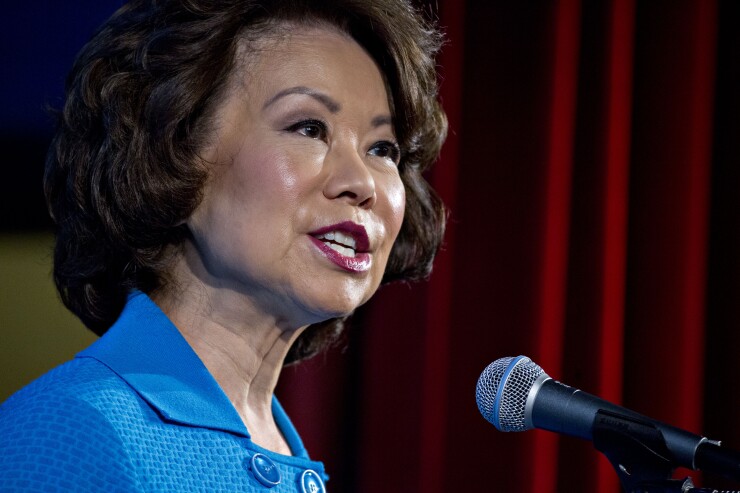DALLAS – Democratic lawmakers on the Senate Environment and Public Works Committee cautioned Transportation Secretary Elaine Chao about the White House making a partisan issue of the Trump administration’s infrastructure proposal when details are unveiled in coming weeks.
Infrastructure renewal is too important of an issue to let it get caught up in congressional political battles, Sen. Sheldon Whitehouse, D-R.I., said during a committee hearing on Wednesday.
“One can foresee considerable tumult ahead in Washington in a whole variety of areas,” he said. “I hope the administration does not try to jam Congress on an infrastructure bill but rather works in a bipartisan, bicameral fashion to get something passed that everyone can celebrate when the day is done.”
Chao assured Whitehouse that the administration would work with Democrats as well as Republicans to pass an infrastructure renewal package with $200 billion of new direct federal funding.
“Of course we would like to cooperate with Congress because without your cooperation there is no bill,” she said. “This is one of the few vehicles in which we hope to have bipartisan cooperation.”

The focus should be on innovative and creative methods of financing infrastructure, said Sen. Thomas Carper, D-R.I., the ranking Democrat on the panel.
“I was encouraged the other day when the president said he could support a higher gasoline tax but then it was taken off the table,” he said. “We need presidential leadership. If he will lead, we can get something done.”
There is no single overall solution to the funding infrastructure renewal efforts, Carper added.
“There is no silver bullet,” he said. “There are just a lot of silver BBs.”
President Trump has directed a 16-agency infrastructure task force working on the plan to release a statement of principles for his infrastructure renewal program by the end of May with a full proposal going to Congress in the third quarter, Chao said.
“The president has made clear that modernizing our nation’s crumbling infrastructure, including our nations highway and bridges, is one of his top priorities,” she said. “The goal is to increase the total amount of infrastructure investment, while delivering better transportation outcomes for Americans.”
Lawmakers from both parties representing mostly rural states pressed Chao on the reliance on public-private partnerships in the Trump proposal, which they said were not viable in their states. She promised that the plan will recognize the different needs of the states.
The proposal is designed to leverage federal dollars by incentivizing state, local, and private sector investment in infrastructure, Chao said.
“We recognize the difference between urban and rural infrastructure needs,” she said. “It will address infrastructure development in both urban and rural areas in ways that are supportive of a wide range of funding options and sensitive to funding challenges faced by some communities.”
Committee chairman Sen. John Barrasso, R-Wyo., said he was reassured by Chao’s view on rural infrastructure but would reserve judgment until details are available.
“I think she has a full understanding of the needs that we have all around the country and the difference in where public-private partnerships may work effectively and others where they won’t, based on population,” he said after the hearing.
“Public-private partnerships can be effective in urban areas, but do not work for rural states like Wyoming, and other small and rural states,” Barrasso said
Sen. James Inhofe, R-Okla., said the Senate should take the lead when Trump’s infrastructure proposal gets to Capitol Hill.
Inhofe was chairman of the committee when it developed the five-year Fixing America’s Surface Transportation Act that was enacted in late 2015.
“Because of our experience in the FAST Act, I would rather get something really specific in the Senate because it turned out that that's what we did anyway," he said.





